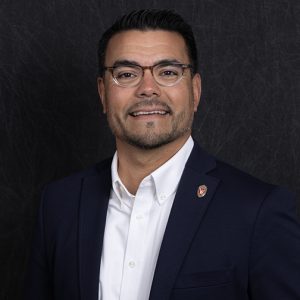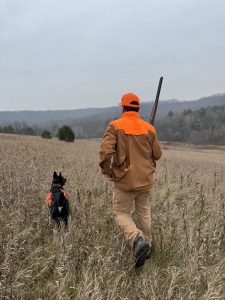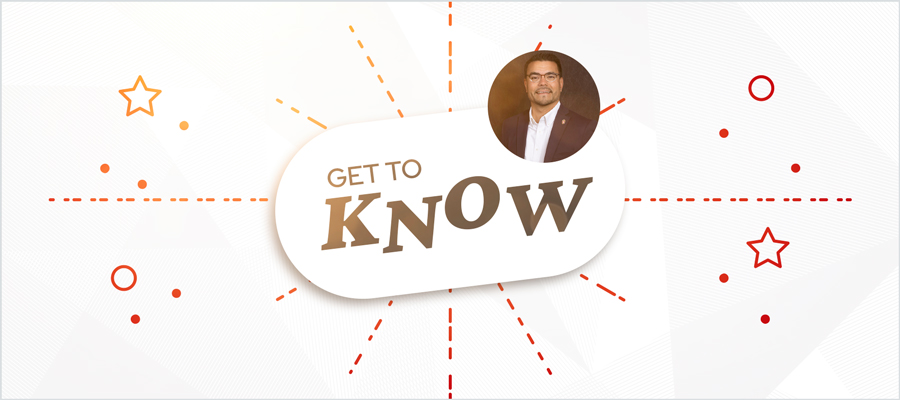 Earlier this month, Dominic J. Ledesma, PhD, officially started his new role as the Division of Information Technology’s inaugural assistant vice provost for culture, climate & engagement. As a new senior leader reporting to Chief Information Officer and Vice Provost for Information Technology Lois Brooks, Ledesma leads the division’s efforts around equity, diversity, inclusion and belonging (EDIB), including strategic planning, goal setting, measuring outcomes, and managing training and programs. He will create a new office within the division focused on advancing employee culture, climate and engagement.
Earlier this month, Dominic J. Ledesma, PhD, officially started his new role as the Division of Information Technology’s inaugural assistant vice provost for culture, climate & engagement. As a new senior leader reporting to Chief Information Officer and Vice Provost for Information Technology Lois Brooks, Ledesma leads the division’s efforts around equity, diversity, inclusion and belonging (EDIB), including strategic planning, goal setting, measuring outcomes, and managing training and programs. He will create a new office within the division focused on advancing employee culture, climate and engagement.
To help you get to know Dominic, he recently sat down with DoIT Communications to share a bit about his background, leadership style and vision for DoIT and his new office. Read on to get to know DoIT’s new senior leader.
What interested you in this role, and what are you most excited about in your new position?
I was definitely interested in how this position would uniquely contribute to shaping and evolving DoIT’s positive organizational culture and climate. This includes opportunities to intentionally create spaces where professionals feel a genuine sense of connection to one another and their role within our division.
It is an interesting time to be working in the organizational development space. The workplace and workforce are always evolving, but recent years have presented a lot of twists and drastic shifts in how society works and lives. Especially since the lockdown phase of the pandemic, leaders in public and private sectors have grappled with how to reimagine the workplace and how employees can balance work with life and vice versa.
Based on my initial impressions, I think DoIT is very forward-thinking on this topic. Even though I am still very new to the division, it is clear that leadership has a good pulse on the challenges and opportunities that influence a 21st-century workplace and workforce. I am excited to work within this leadership culture because you definitely see people at the center of DoIT’s internal culture. In this new position, I hope to enrich the opportunities for how our employees find community and engagement within our division.
What’s something people might be surprised to learn about you?

I like to make maple syrup. I’ve been doing it for almost 4 years now. We converted a 50-gallon steel drum barrel into a wood-fired evaporator. Each spring, I tap about 20 trees at my cabin in Jackson County, Wisconsin. I boil sap about 3 times over the course of a season and end up with about 2 to 3 gallons of syrup. It’s mostly a hobby. We consume most of it or gift it to friends and family. It’s a lot of work, but it’s also a lot of fun.
How would you describe your leadership style and approach?
I never lose sight of the fact that I am constantly learning new things. Because of that, I always strive to practice humility and grace. And while I take my work seriously, I never take myself too seriously. In terms of my leadership style, I strive to be a positive collaborator and a contributor. Regardless of the team composition or effort, it is always important for me to develop positive and supportive working relationships with my colleagues. Strong relationships are critical for success and add significant value to any process. Additionally, whether I am leading an effort or playing a more supportive role, I am always going to look for ways to validate, honor and empower the professional and personal assets that others bring to the team.
What accomplishments are you proud of from previous roles you’ve held?
Two examples come to mind. First, I am proud of establishing the Learning Community for Inclusive Organizational Citizenship in my previous position with the Division of Extension. We often view our social identities as “next to” to our professional identities. I see our personal identities as inextricably tied to our professional identities—regardless of our position, duties or scope of focus. Similarly, engaging in EDIB work that is co-constructed and relational in nature has traditionally been seen as a “nice to have” component of professional development. I see it instead as a “need to have.” Those principles were guideposts for creating the Learning Community. They offered a vehicle for employees to actively participate in learning and dialogues that encouraged awareness of self and others. It also brought together employee cohorts who otherwise would not regularly interact with one another. Understanding who we are and how we show up in certain spaces—for our sake and the sake of others—is paramount for promoting and sustaining safe, respectful and inclusive environments.
Second, I returned to campus in 2010 to work in student affairs. I spent 6½ years working for the Mercile J. Lee Scholars Program. The program had around 500 undergraduate students, first-years through seniors, pursuing majors in all schools and colleges across campus. At the time, the program had no physical space like an office where we could engage with scholars through more casual interactions. So, we could only build connections and relationships with scholars by holding meetings or seeing them around campus. That made it a tall order to build, reinforce and sustain the program’s values and culture among scholars. The experience taught me a lot about how I need to show up and be a consistent, visible presence. It also made me think critically about how to leverage relationships and virtual spaces to promote a safe, positive and inclusive program culture. I never really thought about this until now, but my time within the programs was probably my first gig in the organizational culture and development space.
What are some initial goals and priorities you have for your first few months in this new role?
Listen. Learn. Reflect. Repeat.
What do you think we’re doing well in the division regarding diversity, equity and inclusion?
For starters, I am impressed with the co-chairs and members of DoIT’s Equity, Diversity, and Inclusion Committee (EDIC). Seeing their energy and enthusiasm is awesome. I know they will continue to be a strong asset and support for this new role and office.
Second, I think DoIT is doing some very exciting work in digital accessibility, including policy development and the support to help implementation. The work we’re doing in this area reminds us that compliance with federal civil rights laws should represent the floor, not the ceiling. It’s a testament to our progress to see the work we’re doing and the resources we’re developing to advance a praxis around accessibility.
These are both part of what I said earlier about how apparent it is that DoIT strives to put people at the center of everything it does. It is wonderful to see a strong emphasis on building and sustaining a divisional culture that is positive and supportive. And even though I am very new, I can sense this on multiple levels of leadership within the division. It’s an essential foundation for any organization, especially if the goal is to holistically promote and advance EDIB goals in a more strategic and coordinated manner. As I move forward in this role, I will pay close attention to how our office can contribute, collaborate and lead.
What role will data analysis play in measuring the success and progress of our DEI programs?
There is no question that data—both quantitative and qualitative—is an integral part of measuring, tracking, and evaluating the progress and impact of any EDIB program or initiative. So, yeah, you need data. Anyone in a position like this needs a skill set for understanding how to work with data. By training, I’m a critical qualitative researcher (shoutout to the School of Ed’s Educational Leadership and Policy Analysis department!) and a professional who has designed studies that integrate culturally responsive research practices. So designing, collecting and analyzing data has enriched my vantage point as an administrator, allowed me to ask better questions, check assumptions (including my own), and invoke a degree of “benevolent skepticism” whenever and wherever necessary. I am always interested in what story the data is telling us. On the other hand, my training also equips me with a perspective to consider what story the data might not tell us (but which needs to be acknowledged, included, heard and centered).
This division has a high percentage of employees who work remotely. What ideas do you have for assessing and enhancing workplace climate and engagement for remote employees?
In my previous position with Extension, there was also a geographically distributed employee base with a large percentage of folks working remotely, either partially or full-time. So, I am not new to this type of work environment, but I am also no expert. I think DoIT has far more collective experience and expertise on this topic, and I am excited to learn more as I go. That said, I have always taken a special interest in promoting and sustaining quality and consistent interactions among employees, whether in-person or virtual. In fact, I think this has always been a workplace climate matter.
I believe it is essential for leadership to communicate and model healthy values and norms for a largely remote workplace. For example, we can observe a scheduled “early end” for meetings, respect a person’s work vs. non-work hours and have diversified channels for communication. I think workplace climate surveys, like the one DoIT implemented over the past few years, can also help us understand how to keep pace and be responsive to needs, issues and priorities.
I am interested in exploring other ideas and initiatives that enable employees to personalize their work experience, build their capacity as professionals, and find community, connection and mentorship. I want this office to help strengthen the “story” of our division’s work and mission. By this, I mean exploring ways to uniquely elevate the narrative of DoIT professionals and how their work helps uphold and advance our divisional mission, goals, and priorities on campus and beyond. I have already heard several members of the leadership team refer to this as “making the work more visible.”
DEI work can be intense and challenging. What do you do to unwind, relieve stress and seek balance in your life?

I enjoy spending time outdoors, which to me means being outside the city and on water or in the woods. I enjoy fly fishing, hunting and gathering medicines. I’m always trying new hobbies and starting new projects that involve making, building or fixing things. Being able to do these things with family and friends really helps me maintain a balance in life and manage stress through healthy outlets.
Who inspires you? What influence or inspiration do you take from their examples?
My life and career have been significantly influenced by great mentorship. I think about several personal, professional and academic mentors who have supported me over the years. When I think about our relationships, I see a common thread. They were all teaching me (and showing me) 2 things. First, they were teaching me how to understand people. Second, they were teaching me how to invest in people.
One of these mentors is Eden Inoway-Ronnie, the provost’s chief of staff. Eden has been on campus for many years and has served as chief of staff for several provosts. I had the opportunity to work closely with her early in my career in student affairs. I have always admired her and her work. She is not only incredibly good at what she does, she is also an awesome person. I do not know if there is anyone on this campus who better understands our institution and the cultures within it. Eden is wicked smart, wicked skilled, and wicked down-to-earth. And the fact that she has always made time to support me at any point in my life or career means a lot.
